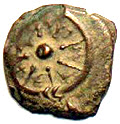Background
![]()

In ancient times the Scribes were Jewish officers who performed duties which
included various kinds of writing, but when the Jews returned from the
Babylonian captivity, the soferim, or Scribes, were organized by Ezra
into a distinct body. These Scribes became the interpreters and copyists of
God's law. Among these duties, they copied the Pentateuch, the Phylacteries, and
the Mezuzoth. (Deut. 6:9).
Once the Canon of Old Testament Scripture was complete, and inspiration of the
prophetic period in Old Testament times had been accomplished, we need to trace
the degeneration of these men known as "Scribes" and the position of
power by which they assumed.
History reveals that foreign influences pervaded the land of Judea throughout the Inter-Testamental period, and onward to the Christian era. Greek culture and Hellenization threatened the very existence of Judaism and the chosen people, the Jewish religious leaders determined that the law needed to be preserved with the most jealous care.
In order to preserve the law of God, it needed to be studied carefully, and all of its precepts needed to be given application according to the ever-changing way of public and private life in Israel. By developing a system of rules for people to follow, they forgot the heart and spirit of the law. Their prescriptions did not allow anyone the freedom to truly seek the LORD.It seems as though the two main principles of the Scribes were, first, the multiplying of oral traditions in putting a fence around the law. Second, their interpretation and exposition of Scripture had utterly destroyed its original meaning. Instead of honoring the law, in reality they were destroying it.
They were so careful in their copying that they counted every letter, and then compared the total number of the document with that which they were copying from. If the numbers did not match the copy was burned. They were meticulous in making sure that no words were left out that belonged to the text, nor any words admitted improperly.These Scribes would read the Torah in the synagogues, give commentary, and lecture their disciples.
The Scribes were also called "lawyers" and the "doctors of the law". They were all highly educated from a young age, and at an appropriate time (some say by the age of 30) they were elected to office.They were not only copyists of the law, but they were also the preservers of the oral tradition, which included the commentaries and additions to the law. This oral tradition accumulated over the course of time into a great mass, and was regarded by most to be equal or even greater than the law itself.
It was to these oral traditions that Jesus so often attacked (see Mark 7:5-13). Even Paul the apostle spoke of himself as having been at one time "exceedingly zealous of the traditions" of his fathers (Gal 1:14).The Scribes also developed forced interpretations of the law, attempting to find a hidden meaning in every word, syllable, and letter. Jesus charged them saying "Woe unto you, lawyers! For you have taken away the key of knowledge, you entered not in yourselves, and those that were entering in you hindered." (Luke 11:52).
During the time of Jesus Christ the Jewish people were very dependent upon the Scribes. The language of the Jews was passing into the Aramaic dialect, and most of the people were unable to understand their own Torah, and gladly excepted the interpretation which was given by the Scribes.The people were amazed by the authority in which Jesus spoke "I say unto
you". The Scribes had little patience with sinners while Jesus enjoyed
mingling with the people and encouraging them that God loves them regardless of
their sins.
![]()
Read The Bible
- 1599 Geneva Bible (GNV)
- 21st Century King James Version (KJ21)
- American Standard Version (ASV)
- Amplified Bible (AMP)
- Amplified Bible, Classic Edition (AMPC)
- Authorized (King James) Version (AKJV)
- BRG Bible (BRG)
- Christian Standard Bible (CSB)
- Common English Bible (CEB)
- Complete Jewish Bible (CJB)
- Contemporary English Version (CEV)
- Darby Translation (DARBY)
- Disciples’ Literal New Testament (DLNT)
- Douay-Rheims 1899 American Edition (DRA)
- Easy-to-Read Version (ERV)
- English Standard Version (ESV)
- English Standard Version Anglicised (ESVUK)
- Evangelical Heritage Version (EHV)
- Expanded Bible (EXB)
- GOD’S WORD Translation (GW)
- Good News Translation (GNT)
- Holman Christian Standard Bible (HCSB)
- International Children’s Bible (ICB)
- International Standard Version (ISV)
- J.B. Phillips New Testament (PHILLIPS)
- Jubilee Bible 2000 (JUB)
- King James Version (KJV)
- Lexham English Bible (LEB)
- Living Bible (TLB)
- Modern English Version (MEV)
- Mounce Reverse Interlinear New Testament (MOUNCE)
- Names of God Bible (NOG)
- New American Bible (Revised Edition) (NABRE)
- New American Standard Bible (NASB)
- New American Standard Bible 1995 (NASB1995)
- New Catholic Bible (NCB)
- New Century Version (NCV)
- New English Translation (NET)
- New International Reader's Version (NIRV)
- New International Version - UK (NIVUK)
- New International Version (NIV)
- New King James Version (NKJV)
- New Life Version (NLV)
- New Living Translation (NLT)
- New Matthew Bible (NMB)
- New Revised Standard Version (NRSV)
- New Revised Standard Version Catholic Edition (NRSVCE)
- New Revised Standard Version, Anglicised (NRSVA)
- New Revised Standard Version, Anglicised Catholic Edition (NRSVACE)
- New Testament for Everyone (NTE)
- Orthodox Jewish Bible (OJB)
- Revised Geneva Translation (RGT)
- Revised Standard Version (RSV)
- Revised Standard Version Catholic Edition (RSVCE)
- The Message (MSG)
- The Voice (VOICE)
- Tree of Life Version (TLV)
- World English Bible (WEB)
- Worldwide English (New Testament) (WE)
- Wycliffe Bible (WYC)
- Young's Literal Translation (YLT)
Table of Contents
Main Menu
- Ancient Assyrian Social Structure
- Ancient Babylonia
- Ancient Canaan During the Time of Joshua
- Ancient History Timeline
- Ancient Oil Lamps
- Antonia Fortress
- Archaeology of Ancient Assyria
- Assyria and Bible Prophecy
- Augustus Caesar
- Background Bible Study
- Bible
- Biblical Geography
- Fallen Empires - Archaeological Discoveries and the Bible
- First Century Jerusalem
- Glossary of Latin Words
- Herod Agrippa I
- Herod Antipas
- Herod the Great
- Herod's Temple
- High Priest's in New Testament Times
- Jewish Literature in New Testament Times
- Library collection
- Map of David's Kingdom
- Map of the Divided Kingdom - Israel and Judah
- Map of the Ministry of Jesus
- Matthew Henry Bible Commentary
- Messianic Prophecy
- Nero Caesar Emperor
- Online Bible Maps
- Paul's First Missionary Journey
- Paul's Second Missionary Journey
- Paul's Third Missionary Journey
- Pontius Pilate
- Questions About the Ancient World
- Tabernacle of Ancient Israel
- Tax Collectors in New Testament Times
- The Babylonian Captivity
- The Black Obelisk of Shalmaneser
- The Books of the New Testament
- The Court of the Gentiles
- The Court of the Women in the Temple
- The Destruction of Israel
- The Fall of Judah with Map
- The History Of Rome
- The Incredible Bible
- The Jewish Calendar in Ancient Hebrew History
- The Life of Jesus in Chronological Order
- The Life of Jesus in Harmony
- The Names of God
- The New Testament
- The Old Testament
- The Passion of the Christ
- The Pharisees
- The Sacred Year of Israel in New Testament Times
- The Samaritans
- The Scribes
Ancient Questions
- Why Do the Huldah Gates Appear Different in Ancient Replicas and Modern Photos?
- What Is the Origin of the Japanese and Chinese Peoples? A Biblical Perspective
- How did the ancient Greeks and Romans practice medicine and treat illnesses?
- What were the major contributions of ancient Babylon to mathematics and astronomy?
- How did the ancient Persians create and administer their vast empire?
- What were the cultural and artistic achievements of ancient India, particularly during the Gupta Empire?
- How did ancient civilizations like the Incas and Aztecs build their remarkable cities and structures?
- What were the major trade routes and trading practices of the ancient world?
- What was the role of slavery in ancient societies like Rome and Greece?
- How did the ancient Mayans develop their sophisticated calendar system?
Bible Study Questions
- Why Do Christians Celebrate Christmas?
- How Many Chapters Are There in the Bible?
- The Five Key Visions in the New Testament
- The 400-Year Prophecy: Unpacking Genesis 15 and the Journey of a People
- The Authorized (King James) Version (AKJV): Historical Significance, Translation Methodology, and Lasting Impact
- Exploring the English Standard Version (ESV): Its Aspects, Comparisons, Impact on Biblical Studies, and Church Use
- A Detailed Historical Analysis of Language Updates in the KJ21: Comparison with Other Versions
- A Detailed Historical Analysis of the American Standard Version (ASV): Comparison to the King James Version, Influence on Later Translations, and Evaluation of Strengths and Weaknesses
- A Detailed Historical Analysis of Amplifications in the Amplified Bible (AMP) and Its Comparison to Other Bible Translations
- Detailed Historical Analysis of the Amplified Bible Classic Edition (AMPC): Examples of Amplifications and Comparative Analysis with Other Bible Translations
About
Welcome to Free Bible: Unearthing the Past, Illuminating the Present! Step into a world where ancient history and biblical narratives intertwine, inviting you to explore the rich tapestry of human civilization.
Discover the captivating stories of forgotten empires, delve into the customs and cultures of our ancestors, and witness the remarkable findings unearthed by dedicated archaeologists.
Immerse yourself in a treasure trove of knowledge, where the past comes alive and illuminates our understanding of the present.
Join us on this extraordinary journey through time, where curiosity is rewarded and ancient mysteries await your exploration.
Recent posts
-

Best gemstones for stud earrings for 15 years girl
Selecting the perfect pair of stud earrings for a 15-year-old girl is an exciting yet thoughtful process. Stud earrings are a timeless accessory, offe... -

Prayers for Prophets: A Reflection on Reverence and Intercession
Prophets hold a revered status across many of the world’s major religions. As individuals chosen to convey divine messages, they are often remembere... -

How Machine Learning is Reducing Risk in Automated Trading
In today’s fast-paced monetary markets, automated buying and selling has come to be a cornerstone of current making an investment. Algorithms now ex... -

Timur Turlov: Driving Global Investment Innovation Through Freedom Holding Corp.
Timur Turlov leads Freedom Holding Corp. (NASDAQ: FRHC) as its CEO where he connects technology with finance and global markets. Turlov established Fr... -

AI in the Legal Industry: Can Algorithms Replace Lawyers?
The legal career is historically considered as a discipline rooted in human judgment, nuance, and vital questioning. But in recent years, Artificial I...